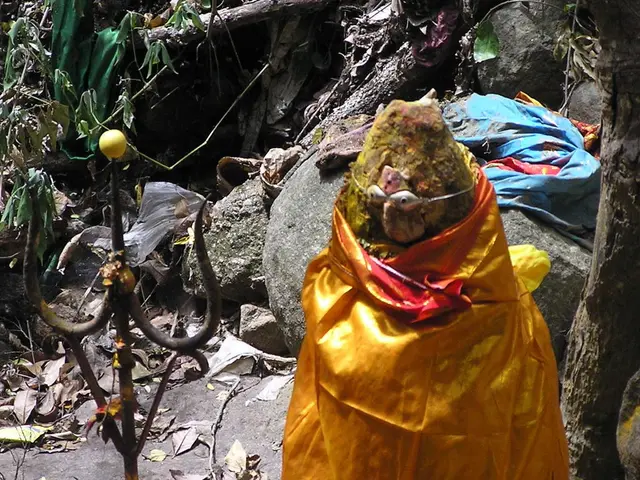Cholera ravages the Tawila refugee camp
In the heart of North Darfur, Tawila locality is grappling with a severe and worsening cholera outbreak. As of mid-August 2025, nearly 3,000 suspected cholera cases have been officially recorded, although the true number is believed to be underestimated. The outbreak, which has affected four Darfur states since August 2024, has caused over 2,400 deaths across Sudan [1][2][4].
The cholera epidemic is fueled by inadequate water, sanitation, and hygiene (WASH) conditions, severe overcrowding in internally displaced persons (IDP) camps, and limited access to health services due to conflict disruptions. Hospitals in Tawila have been bombed or shut down, making cholera treatment and containment challenging [1][3][5].
The makeshift shelters in Tawila, home to over 560,000 people, lack soap and proper toilets. Children often defecate outdoors, attracting insects to the remains of meager meals near barely washed bowls [6]. The UN warns that flooding during the rainy season, which peaks in August and extends until October, could exacerbate the threat of epidemics [7].
Humanitarian aid efforts include MSF managing most cholera case treatments in Tawila and UNICEF’s efforts to establish oral rehydration points and deliver drug kits. UNICEF plans to distribute over 1.4 million doses of oral cholera vaccine and scale up supplies like soap, latrine slabs, and plastic sheeting. However, delivery is hampered by access constraints due to ongoing conflict [1][3][4].
Médecins Sans Frontières (MSF) has set up a treatment center with a capacity of 160 beds in Tawila, planning to expand it to 200 beds in the coming days. The organization treated over 1,500 cholera patients in Tawila in just two weeks, and around 300 children with cholera have been recorded since April by the UN [8].
The UN has called for urgent funding of $30.6 million to support the cholera response. In addition, improved coordination among health actors, expanded vaccination campaigns, and enhanced WASH services are crucial to controlling cholera transmission and saving lives in this severely compromised humanitarian environment [1][3][4][5].
Convoys delivering humanitarian aid are often denied access to distressed populations due to fighting and armed groups, notably the FSR. Roads also become impassable with the rainy season [7]. Mona Ibrahim, a resident of a camp in Tawila, has been living there for two months and admits to mixing lemon in the water as a makeshift remedy [6].
The cholera outbreak in Tawila underscores the urgent need for increased aid, improved coordination, and enhanced WASH services to combat this public health emergency in a conflict-ridden region.
References: [1] https://www.who.int/news-room/articles-detail/worse-cholera-outbreak-in-sudan-as-rainy-season-approaches [2] https://www.unicef.org/press-releases/sudan-cholera-outbreak-spreading-across-all-sudanese-states-unicef [3] https://www.unicef.org/press-releases/sudan-cholera-outbreak-worsens-tawila-darfur [4] https://reliefweb.int/report/sudan/sudan-cholera-outbreak-worsens-tawila-darfur [5] https://www.msf.org/sudan/article/msf-treats-over-1-500-cholera-patients-in-tawila-darfur [6] https://www.aljazeera.com/news/2025/8/1/sudan-cholera-outbreak-in-tawila-darfur-leaves-residents-desperate [7] https://www.reuters.com/world/africa/floods-threaten-sudans-cholera-victims-amid-rainy-season-2025-08-02/ [8] https://www.who.int/news-room/articles-detail/sudan-cholera-outbreak-spreading-across-all-sudanese-states
Read also:
- Transmissible Infections and Parasites Found in Untreated Berries
- Symptoms indicative of acute myeloid leukemia (AML)?
- Discover the Potency of Herbs: Harnessing Nature's Power for Enhanced Brain Performance
- Essential Information About Selenium: A Key Element to Keep in Balance (Yet Careful Not to Overindulge)







